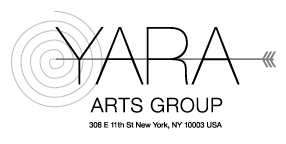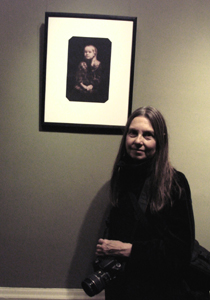
Margaret Morton and her installation interpreting Oksana Zabuzhko's "A Portrait: K. M. Hrushevska in her Youth"
photo by Svitlana Matviyenko
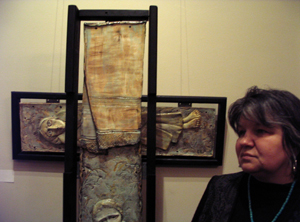
Kateryna Nemyra and her interpretation of Pavlo Tychyna's "Wheat Rot"
photo by Svitlana Matviyenko
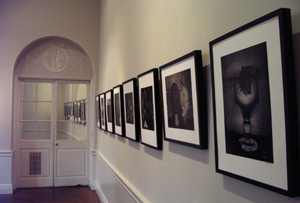
Petro Hrycyk's interpretaion of Mykola Vorobyov's"Cage-Balcony-Frost-Dream"
photo by Svitlana Matviyenko
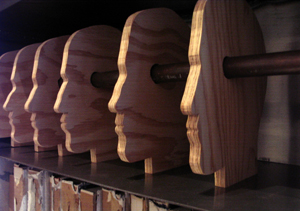
Olena Karasyuk's interpretaion of
Pavlo Tychyna's "Terror"
photo by Svitlana Matviyenko
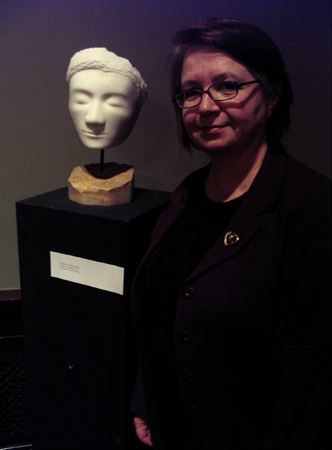
Anya Farion and her interpretaion of Oksana Zabuzhko's "Ironic Nocturne"
photo by Svitlana Matviyenko
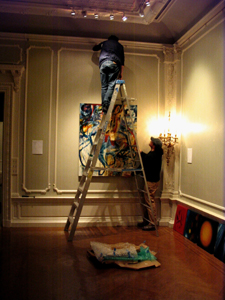
Anatoli Leshchenko and Marko Shuhan installing Shuhan's interpretation of Yurko Pozayak's "Come See Me Tomorrow"
photo by Svitlana Matviyenko
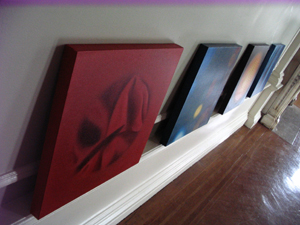
Ilona Sochynsky's interpretation of Ludmyla Taran's "India Ink"
photo by Svitlana Matviyenko
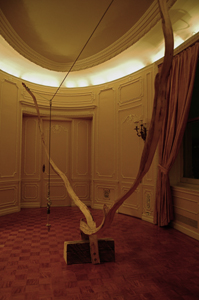
Roman Hrab's interpretation of Volodymyr Svidzinsky's "The Pendulum's Tired"
photo by Roman Hrab
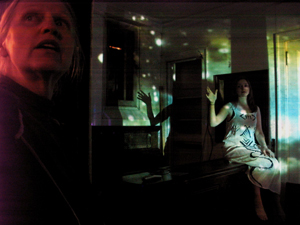
Marybeth Ward and her interpretation of Attila Mohylny's "Flying South
photo by Svitlana Matviyenko
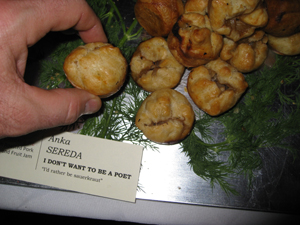
Olesia Lew's interpretation of Anka Sereda's "I Don't Want to Be a Poet"
photo by Virlana Tkacz
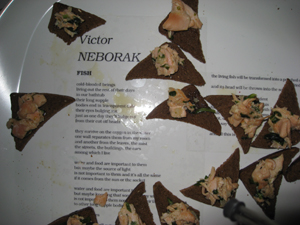
Olesia Lew's interpretation of
Victor Neborak's "Fish"
photo by Virlana Tkacz
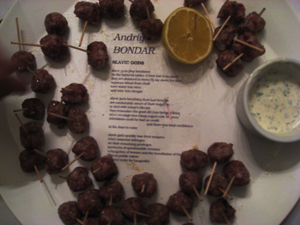
Olesia Lew's interpretation of Andriy Bondar's "Slavic Gods"
photo by Virlana Tkacz
|
IN A DIFFERENT LIGHT
Ukrainian poetry: translations, interpretations and revisions
January 18-19, 2008
Ukrainian Institute of America
2 East 79th St @ Fifth Avenue, New York
Yara’s weekend festival featured bilingual poetry performances by Yara actors, a concert by Mariana Sadovska and readings by contemporary writers, as well as an exhibit of contemporary visual art by 19 artists inspired by Ukrainian poems translated by Virlana Tkacz and Wanda Phipps. The audience also enjoyed music and food inspired by poems. Since 1990 Yara has created fourteen major events at the Ukrainian Institute, including four weekend festivals of art, music and poetry.
For a list of participants and events:
In a Different Light
PRESS EXCERPTS
POEMS YOU CAN… SEE
A festival of Ukrainian poetry in New York
by Kateryna Kindras, Meest January 24, 2008.
"...Last Friday and Saturday at the Ukrainian Institute, which is located on Fifth Avenue across the street from the Metropolitan Museum, so many people arrived for “In a Different Light,” the winter festival of Ukrainian poetry that there was no room to sit or even stand. This is a total anomaly for contemporary Ukrainian events.
At the festival Ukrainian poetry was presented at in translations, interpretations and revisions. The main organizer of the festival was the artistic director of Yara Arts Group, Virlana Tkacz, recently named Honored Artist of Ukraine. Knowing her sense of style from her productions, we expected the event not to fit into any canonical frames in terms of either form or content and to be very modern. And our extectations were indeed met.
Many visual artist, poets, musicians, filmmaker, and actors took part in the festival on January 18th and 19th, in a word all the creative people who, inspired by the authors, could express poetry in their own media.
“This was the essential idea of the project” said Svitlana Matvienko, co-curator of the festival, who was born in Kamienets-Podilsk graduated from the University of Kyiv-Mohyla Academy and now is working on her doctorate at the University of Missouri. "My own response to a poem by Kharkiv poet Serhiy Zhadan’s poem “Oceans” was a video.”…
At the festival you could also see poetry through an installation created by Marybeth Ward reacting to Attila Mohylny’s poem “Flying South through the Night.” The play of light, color, mirrors and a living sculpture, a role played by a young actress of Moldavian background transformed the library of the Institute into the poetic world created by Attila Mohylny.
You could also see poems interpreted by photographer Petro Hrycyk, master of a special printing technique. Through his photographs he “read” the poetry of Mykola Vorobyov so deeply that it seems now all his poems should be read with Petro Hrycyk’s photographs.
The festival also included musical interpretations of poetry. These included Odarka Polanska on harp, Julian Kytasty on bandura, and Halyna Remz on violin. Japanese dancer Shigeko Suga showed how a poem by Attila Mohylny could be interpreted through the movements, gestures and rhythms of Butoh, a Japanese form of dance. The unparalleled Mariana Sadovska translated the poetry of Pavlo Tychyna into ritual songs from various regions of Ukraine.
The festival also included literary readings, a concert by New York Bandura, as well as culinary interpretations of various Ukrainian poems by Olesia Lew.
Virlana Tkacz told Meest “We wanted to fill all three floors of the Ukrainian Institute of America and started our festival in a small darkened room on the first floor. We gradually spot lit a sculpture of a strong male body that seemed hewn out of rock from which flows a female form, like a droplet. The greatest secret on earth is born of this. That is why we started from here and then rose up the stairs, step by step, to where all possibilities hovered, where you could see, feel, hear and even taste poetry.
After this festival Virlana Tkacz whose popularity is hardly lacking, should definitely grow in our community. Everyone is convinced that through her events she creates the possibility of seeing “In a Different Light,” not only poetry or music, but our lives and ourselves."
CONTACT: POET AND DIRECTOR VIRLANA TKACZ
“Our diaspora conserved culture… Now the time has come for Ukraine to support Ukrainians abroad."
by Oksana Lutsyshyna, Dzerkalo Tyzhdnia (Kyiv), March 22-28, 2008
Virlana Tkacz, a director at La MaMa Experimental Theatre, organized a festival of Ukrainian poetry which recently took place at the Ukrainian Institute of America (a fantastic French Gothic style building in the heart of Manhattan) to celebrate the forthcoming publication of an anthology of Ukrainian poetry in English entitled “In a Different Light.” The editor of the book is scholar Olha Luchuk, who together with Michael Naydan edited “One Hundred Years,” a bilingual anthology of Ukrainian poetry. “In a Different Light” includes translations that Virlana created together with a famous American poet Wanda Phipps. The impressive bilingual tome of several hundred pages (nearly twenty years of work!) contains Ukrainian poetry from Taras Shevchenko and Pavlo Tychyna to contemporary authors such as Oleh Lysheha, Attila Mohylny, Andriy Bondar, Neda Nezhdana, Serhiy Zhadan and Oksana Zabuzhko, as well as many others.
“We did not know what our first show would be about”
Virlana, you speak Ukrainian very well, and you know Ukrainian poetry, history and drama. Why is this?
I was born in Newark, a city near New York. I graduated from an art college and then studied directing at Columbia University and Ukrainian at Harvard.
But I know Ukrainian because my family -- thanks to my mother, Alexandra Kysilewska-Tkacz, and my grandfather, Kost Kysilewskyj, who organized Ukrainian schools. We read Tychyna with him. Although then everyone called this poet a communist, my family viewed him differently. I was taught to love poetry -- and I was enchanted by Tychyna.
You are the artistic director of Yara Arts Group, which is a part of La MaMa Experimental Theatre. Yara has created shows based on Ukrainian material. What inspired this?
Well, it started like this… I was invited to lecture on Les Kurbas at the Harvard Ukrainian Summer School. That’s how it all started – we did a show with the students based on a Shevchenko poem Kurbas had staged in 1919. Since then, in eighteen years we have created eighteen shows with Yara, based on many different poets. Till then I only liked Tychyna. I love his collection “Instead of Sonnets or Octaves.” Young actors from New York universities became the core of our group. We did not know what our first show would be about. I worked at La MaMa – but I did nothing Ukrainian, I worked with Native Americans and many others. Then I decided to do something Ukrainian. When the artistic director of our theatre, Ellen Stewart, heard about this, she said: “Well, it about time.” She pulled out her notebook and asked “What are you going to call your show?” I thought, if I don’t say anything right now there won’t be a show. So I said -- “A Light from the East.” “How about March?” she said. “Fine,” I said. I came home and realized what I had done: ‘Oh my God, how am I going to do this? Ukrainian poetry – well, let’s see. Kurbas staged some poems by Shevchenko. So, I read the entire, Kobzar. I had to choose something that an American audience could appreciate without any explanation, without knowing anything about Ukrainian history. Then I decided to ask my actors to write something about themselves, about what they think is the essence of theatre. What is most import in theatre? What is their task? I started reading what they wrote and felt I had read all this somewhere before. All these things they had written. Soon I realized where – Les Kurbas’s diaries and the things his actors at the Young Theatre wrote about what they wanted to do in theatre after they toured the villages and saw the reactions of the audiences. That is the material we used to create our bilingual show. In it our actors at first play themselves – and then they portray Kurbas’s actors. We staged poems by Shevchenko, Tychyna and Skovoroda. We took the show to Ukraine in 1991 and opened the day of the coup in Moscow. We played in Kyiv, Lviv and Kharkiv – in theatres where Kurbas worked.
Your translations with Wanda Phipps are considered to be some of the best in English. In 2005 your translations won an award from the National Endowment for the Arts. Now “In a Different Light,” an anthology of your translations edited by Olha Luchuk will soon appear. It contains works of over 35 Ukrainian poets, as well as traditional material such as dumas (epic songs) and ritual songs. However, you often say that you are not a translator. Why did you start translating poetry?
“In a Different Light”
When we decided to use Ukrainian poetry in our shows, we planned to find the translations. Especially we looked for translations of Tychyna, but these translations did not sound as well on stage as we hoped. Not because they were bad – but they were not for the stage. That is why we started translating. I work with Wanda Phipps, who is a well-known poet. We create our translations for the stage; they must work as poetry that is given voice. Our actors really help us with this. The translations must be alive – if an actor keeps stumbling on the same spot – the translation must be adjusted. Our anthology is structured according to the shows, and includes the translations we used in the shows. A poem must speak to me, otherwise I can’t translate it. We don’t translate rhymed verse.
“Ukrainian culture – is closed…”
You have written a book about Buryat shamanism, and you have done several Buryat shows. How did this happen?
Almost accidentally: Ellen Stewart, the artistic director of La MaMa, one day said to me “Your next show will be in Mongolia.” And so it happened – I became interested in the culture. By the way, Oleh Lysheha, a poet we translate, was also in Buryatia. When I left for Siberia, my mother cried. We worked there with Buryats, made several shows and published a book.
There are beautiful pictures…
The photographer, Alexander Khantaev, was a fashion photographer. Now, they say, “He’s the one who photographs shamans.”
A Festival of Ukrainian Poetry – this is a unique of event. This really is a synthesis, or rather confluence of many arts. What do you see as the point of this event, what is the role, the essence?
The idea of poetry installations happened like this: I was swimming in a pool and suddenly I heard in my mind: “poetry installation, poetry installations…” So I decided to write a letter to some artists and poets and that is how the idea of this festival happened. We wanted Ukrainian poetry to enter into contact with art. This is American-Ukrainian culture or maybe American culture in Ukrainian. Ukrainian culture is closed; no one enters into dialogue with it. People don’t know about it. Ukraine, Uganda people get them mix up here. For instance, people in Ukraine talk about whether there will be a Ukrainian Nobel Prize winner. That is a lot of work. There has to be a dialogue, much effort must be invested in this. It’s not a bolt of lighting out of the blue. It is the result of the work of countless individuals, who lay the ground work. Artistic achievement must be made available to people, to readers. This festival is part of this type of dialogue: poetry and translations, the original in Ukrainian and the American. I must say that Thaya Salamacha and Svitlana Matviyenko really helped me with the preparation for this festival.
Today, the term “diaspora” is understood in many ways: some associate it with the “old guard,” with traditional outmoded attitudes. What does the diaspora mean to you? How do you define it?
The diaspora conserved our culture – canned it. There was a reason – but it was also deadly. A free Ukraine eliminated the reason for conservation. So the diaspora community started to fall apart. The reason why it held together was political, not cultural. Now is the time for Ukraine to support Ukrainians abroad, not the other way around. The community is not what it used to be, but it still has connections. And the government has funds. Poland, the Czech Republic and Slovakia take their diasporas seriously. They sponsor exhibits, events -- but not our government. Americans are interested in their roots -- people who are aware of their own backgrounds tend to be interested in others. They want to know about us, but we have to know how to speak to them. This is something very deep here. There are no defined cultural borders here. There is great interest in other cultures – this is a very natural phenomenon here.
Do you write poetry?
I wrote a poem when I was in Ukraine. But you can’t say it’s a part of contemporary Ukrainian literature, it’s an American thing. It happened when I was in Kharkiv – standing outside the “Slovo” building. It was so strange – I saw Kurbas working on a show, Tychyna reading a poem and Khvylovyi shooting himself… Kurbas and Tychyna are my family; the connection is not blood, but language. This is what my grandfather and mother gave me – the ability to talk with them. Contact. Some people say to me: “What are you doing to poor Tychyna?” But I know he would enjoy it. Me and Tychyna – we have a dialogue. This is what great art is about – it allows many people to enter into dialogue with it.
BEYOND CONTEXT
The festival of Ukrainian poetry was an unforgettable event even in its preparation in Virlana’s quiet kitchen, already mythologized by numerous visitors. It’s located in the old Ukrainian part of town, the East Side. This is old Dutch Manhattan, near the only street that truly runs east-west (all others were drawn geometrically and “east” and “west “ were expediently names: everything right of Fifth Avenue is “east” and left “west”). I walked in on a rehearsal… I heard Serhiy Zhadan’s “Alcohol” as translated by Virlana and Wanda. Two actors from Yara Arts Group founded by Virlana, a young man and woman were reading the poem in two languages: Allison Hiroto in English and Taras Berezowsky in Ukrainian. They were creating a dialogue of cultures, as well as a moving dialogue of people in love, and a metaphor for love itself. After all, even in the most hermetic circles we each speak our own language, and understanding arrives not from words, but from the depth of experience, passed “from heart to heart.”
The festival proved to be such a dialogue, or rather poli-logue of various essences, genres, hearts, texts and people. The invited writers: Askold Melnyczuk, Bob Holman, Wanda Phipps, Vasyl Makhno, Tamara Hanenko, Olena Jennings – read their poems; Yara actors performed their mini-shows based on translations of Ukrainian poetry; visual artists, sculptors, photographers and filmmakers – Ilona Sochynsky, Svitlana Matvienko, Kateryna Nemyra, Joel Schlemowitz and others – presented works inspired by the translations, and musicians violinist Halyna Remez, bandurist Julian Kytasty played their compositions. Mariana Sadovsky sang to poems by Tychyna. Even the culinary arts appeared on the horizon – Olesia Lew prepared an incredible meal, where each dish was truly an extension of a poem. Sophisticated and artistic Virlana, dressed in black, mixed with the audience and directed the event.
Shows, created by Virlana with the Yara Arts Group, are original productions, in which actors are co-creators, and poetry is brought together with life stories and diaries. Virlana has also created one of the most interesting productions of Lesia Ukrianka’s “Forest Song” (“Yara’s Forest Song”) and the translation won an award. Virlana Tkacz is not simple to contextualize as an artist: she creates on the borders of arts, cultures, languages and genres – and is incredibly interesting in this, as well as provocative. Everyone sees her from their own “niche”: some as a director, some as a translator, others --as a scholar researching the work of Les Kurbas or shamanism. Some see her as Ukrainian (recently she was named an Honored Artist of Ukraine) others see her as a representative of the diaspora or an American, or rather a New Yorker, a native of this world city with all its wealth of languages and cultures, in constant movement, crossing all borders, interested in the Other and the cosmopolitan. If you ask Virlana about herself, she smiles and says “Better write about the shows, than about me.” I think this short statement captures her more clearly, that any detailed description.
For more pictures and
information on Yara's In a Different Light
|
